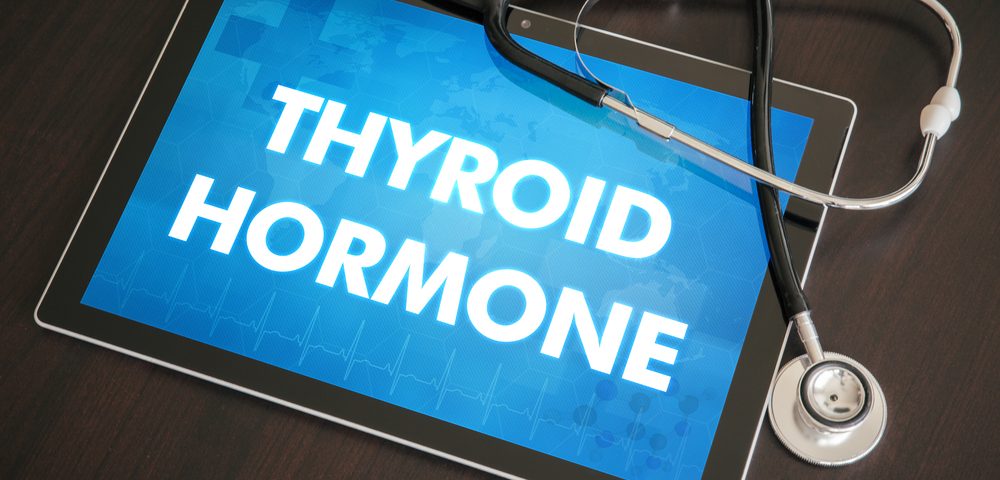A study led by researchers at Yale School of Medicine showed that an inhalation treatment based on thyroid hormone can significantly reverse lung scarring (fibrosis) in mice models of pulmonary fibrosis and in cultured human airway cells.
The study demonstrated that thyroid hormone may represent a potential therapy for diseases involving lung fibrosis, such as idiopathic pulmonary fibrosis (IPF).
The study “Thyroid hormone inhibits lung fibrosis in mice by improving epithelial mitochondrial function” was recently published in the journal Nature Medicine.
To identify the molecular mediators that regulate fibrosis, the research team analyzed the profiles of all the genes expressed in the lungs of healthy people and in IPF patients.
Researchers found that expression and activation of the iodothyronine deiodinase 2 (DIO2) gene was increased in patients compared to healthy individuals. The levels of DIO2 also correlated with disease severity. DIO2 codes for an enzyme that transforms the inactive thyroid hormone into its active form.
Scientists found that mice lacking DIO2 display higher levels of lung fibrosis, suggesting that the thyroid hormone has a protective effect.
To understand the link between the thyroid hormone and IPF development, researchers analyzed the effect of thyroid hormone administration (delivered systemically or in an inhaled form) in two mice models of lung fibrosis.
Thyroid hormone therapy in an inhaled form significantly reversed fibrosis and increased survival in these mice models. Fibrosis reversion was also seen in cultured human airway cells upon thyroid hormone treatment. The inhaled treatment was preferable to systemic delivery, the researchers reported.
“Giving the hormone systemically causes signs of hyperthyroidism,” Naftali Kaminski, MD, the study’s senior author, a professor of medicine and chief of the section of pulmonary, critical care, and sleep medicine at the Yale school, said in a news release.
“But when we delivered the hormone by aerosol [inhaled form], it was not increased in the blood; yet it enhanced the resolution of fibrosis, so the animals treated had significantly less fibrosis than controls despite the fact that they were treated during the established phase of fibrosis,” Kaminski added.
Researchers also found that thyroid hormone therapy restored the function of mitochondria — small organelles that provide energy to a cell — in IPF mice models and also in human airway cells. IPF patients are known to have high levels of damaged mitochondria in their airway cells.
The team believes that the anti-fibrotic properties of the thyroid hormone are associated with protection of airway cells from damage, and a normalization of mitochondrial function. The data provided preclinical evidence that thyroid hormone treatment could diminish fibrosis in vivo, making it a potential therapy for lung fibrosis.
“Our data support further study of the potential role of aerosolized [inhaled] thyroid hormone as a therapy for fibrosis,” Kaminski concluded.
Additional studies regarding dose, safety and efficacy of thyroid hormone therapy in humans are required. Kaminski believes that the inhaled form of administration can potentially avoid unwanted side effects.


Is their any news for those who are suffering from COPD.
So much good news of groundbreaking discoveries on other lung ailments lets those of us with emphysema and related diseases wondering if like efforts are being made in these fields.
Please do not interpret this as sour grapes but an inquiry into what movement is being made in these areas.
God bless all who are in these fields of research and commend them for their sometimes forgotten work.
Frank McGourty
So people with IPF means there have a chance? When is this happing? Does that mean my mother will have a chance for survival?
I have COPD. How can I become a test subject for this study?
I have IPF . In end stage .intrested in any promising chance to reverse this process . Are there human testing going on with this ?
When will this be available for human trials for IPF?
I too am going Downhill fastbwith IPF, I would give anything to take part in trials if there are any planned in UK.
My mother has advanced stage IPF. Can she get in the clinical trial?
I have ILD please let me know how I can get into this study. 45yrs old, healthy other than ILD, never smoked, male 190lbs, 5’11”. Diagnosed in 2010.
I have IPF would love to be part of human trial phase. 6’5″ 200 pounds good health
I HAVE FIBROSIS IN MY LUNGS AND THE SMALLEST EXERTION GETS ME OUT OF BREATH NO MEDS SO FAR 16 MONTHS SINCE DIAGNOSIS.IS THERE ANYTHING TO HELP THIS ILLNESS I WOULD LIKE PREDNISOLONE BUT DOC SAYS NO.ITS THE ONLY THING I HAVE HAD WHICH MADE ME FEEL OK IF FACT FELT GOOD BUT WAS TOLD TO STOP.
I HAVE FIBROSIS IN MY LUNGS AND THE SMALLEST EXERTION GETS ME OUT OF BREATH NO MEDS SO FAR 16 MONTHS SINCE DIAGNOSIS.IS THERE ANYTHING TO HELP THIS ILLNESS I WOULD LIKE PREDNISOLONE BUT DOC SAYS NO.ITS THE ONLY THING I HAVE HAD WHICH MADE ME FEEL OK IF FACT FELT GOOD BUT WAS TOLD TO STOP.
With the Right to Try ACT of 2018 is it possible to get access to this therapy? I will sign the waiver today.